Expectations are sky-high in Los Angeles for the 2021 NFL season. That’s not only the case for the Chargers, who are banking on quarterback Justin Herbert building off a stellar rookie season with an even better second year, but also for the Rams, who are considered to be the third- or fourth-best team in the NFL by betting markets — behind only the blue-chip Kansas City Chiefs and Tampa Bay Buccaneers and roughly tied with the analytics darling Buffalo Bills.
Draft Kings has spread and total lines up for every game except Week 18.
From that, we can derived the implied strength of each team's offense and defense, which is shown below. pic.twitter.com/vZEH0jlkAR
— Lee Sharpe (@LeeSharpeNFL) September 3, 2021
Nevertheless, the Rams are not necessarily favored to win their division, as their +190 odds at DraftKings Sportsbook currently trail the San Francisco 49ers’ +180 odds. However, as the tweet above already suggests, that's largely driven by San Francisco's easier schedule. The injury-riddled 49ers finished fourth in their division last year and are thus scheduled against the Atlanta Falcons and Cincinnati Bengals while the Rams have to face the Buccaneers and Baltimore Ravens.
However, the elephant in the room is that the Rams are considered to be significantly better than the Seattle Seahawks, whose odds to win the division currently stand at +275. And the tweet above suggests the Rams not only have a much better defense than the Seahawks (which might be understandable), but also a slightly better offense. It’s also notable that some books favor the Rams despite their strong schedule — for example, Caesar's and William Hill consider Los Angeles to be the division favorite.
But is that premature praise justified for the Rams, which puts a lot of faith in Matthew Stafford being able to revive their offense? Let's investigate.
CLICK HERE FOR MORE PFF TOOLS:
Fantasy Draft Kit | PFF Betting Dashboard | PFF Fantasy Rankings
PFF Fantasy Projections | NFL Premium Stats | Win Totals Tracker
The 2020 season
We will begin with a look at what happened last season. Of course, what we mostly remember is the Rams' failing offense, but it’s interesting to see that the unit actually did fine halfway through the season, as the estimated team strengths with data through nine weeks show. This plot shows measures of offensive and defensive strengths as measured by expected points added (EPA) per play and accounts for opponents faced.
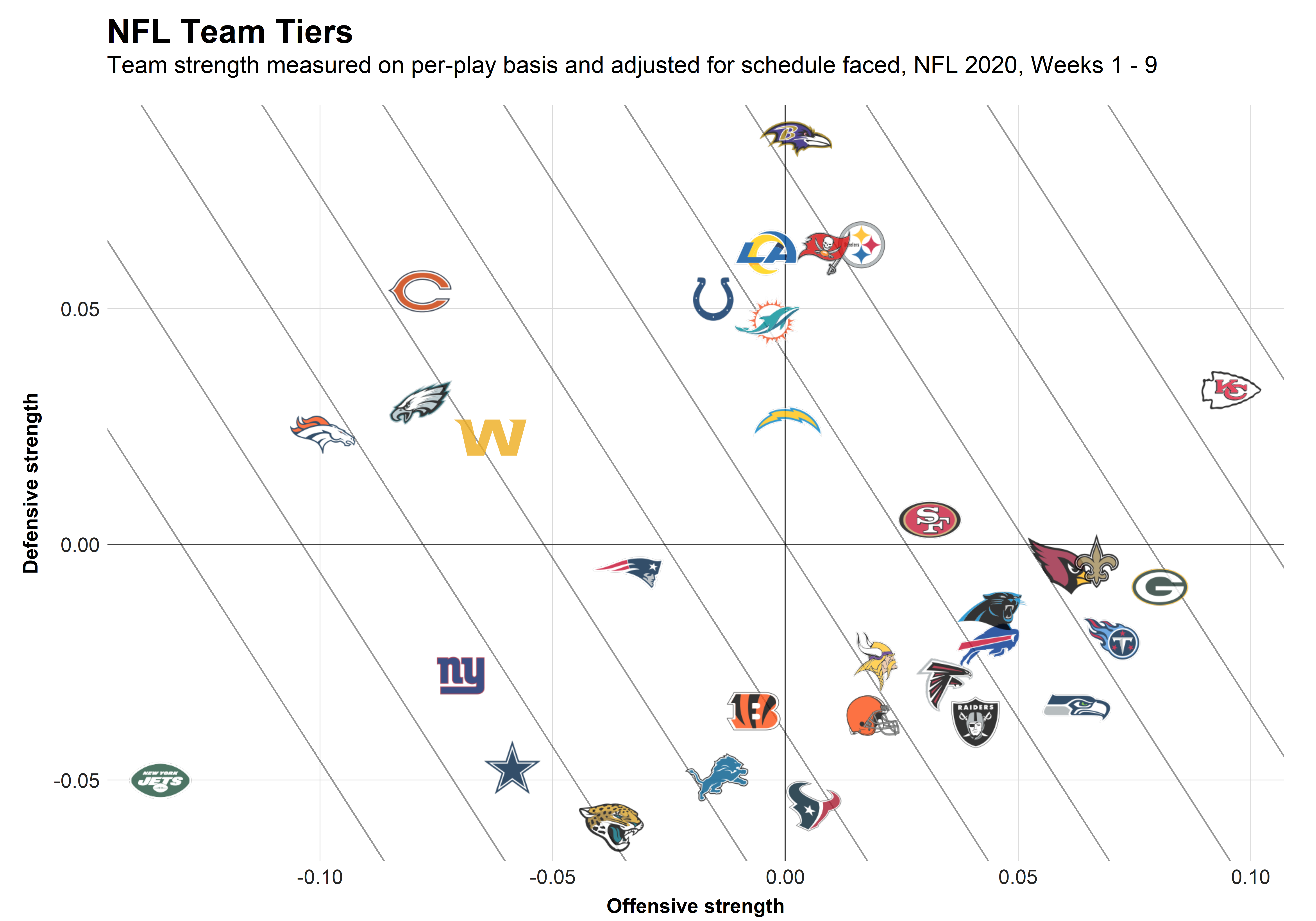
The Rams' offense was roughly average up to that point, but things went southward the following weeks and the team ended up with a clearly below-average offense when looking at the full regular season. These must have been the weeks in which head coach Sean McVay decided he doesn’t want to play another season with Jared Goff as his team's starting quarterback.
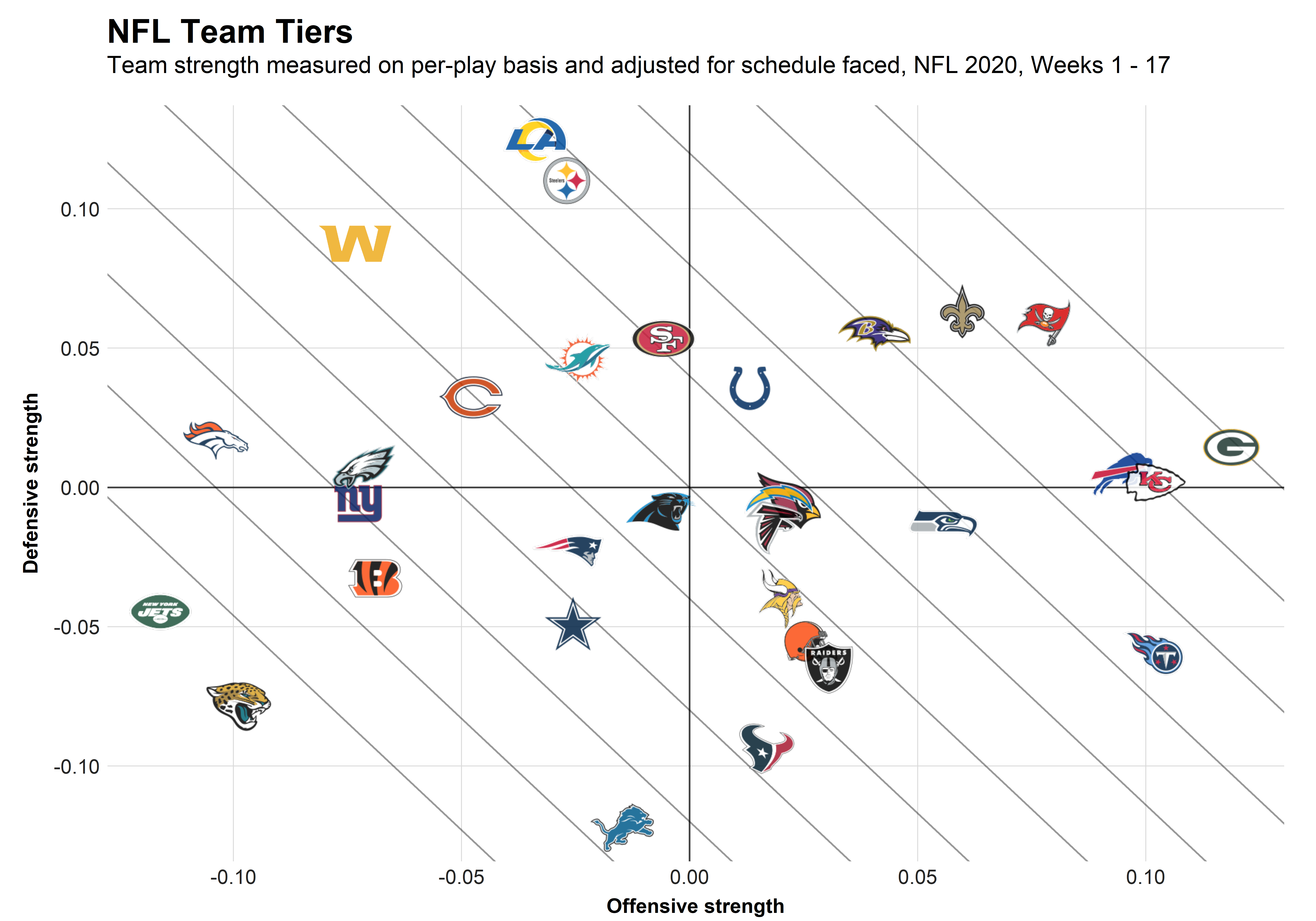
Last season, I often jokingly referred to the Rams as the Steelers West given their close proximity to Pittsburgh in these charts. It’s interesting to see how the betting markets view these two squads in comparison going into this season, as the Rams are considered to be much better. The reason is, of course, the fact that Los Angeles changed out its quarterback and expects a better offense, while the Steelers are giving Ben Roethlisberger one more chance to prove he still has it. And while this might be correct, it’s notable that team strength depends on much more than just the quarterback, so let’s dive into the defense first.
The defense
On the positive side, the Rams apparently fielded the NFL's best defense last year. However, it’s notable that they weren’t as dominant as other top defenses before them — it’s more like them and the Steelers were the only teams that could stop offenses in a year in which most defenses struggled. They weren’t on the same level as the 2017 Jacksonville Jaguars, 2018 Chicago Bears or 2019 New England Patriots.
The comparison to these three defenses already shows some of the problems the Rams will face in 2021: It’s very unlikely they can repeat their impressive results from last year. The 2018 Jaguars regressed to being the fifth-best defense and notably had no significant losses during the offseason. The 2019 Bears regressed to being the seventh-best defense after losing coordinator Vic Fangio, safety Adrian Amos and cornerback Bryce Callahan, and the 2020 Patriots even regressed to being below average after losing far more starters than other top defenses.
In general, no matter whether a defense loses players, the unit tends to regress the following season. The following chart shows the estimated distribution of results in the following year after a defense played a season as well as the Rams last year.
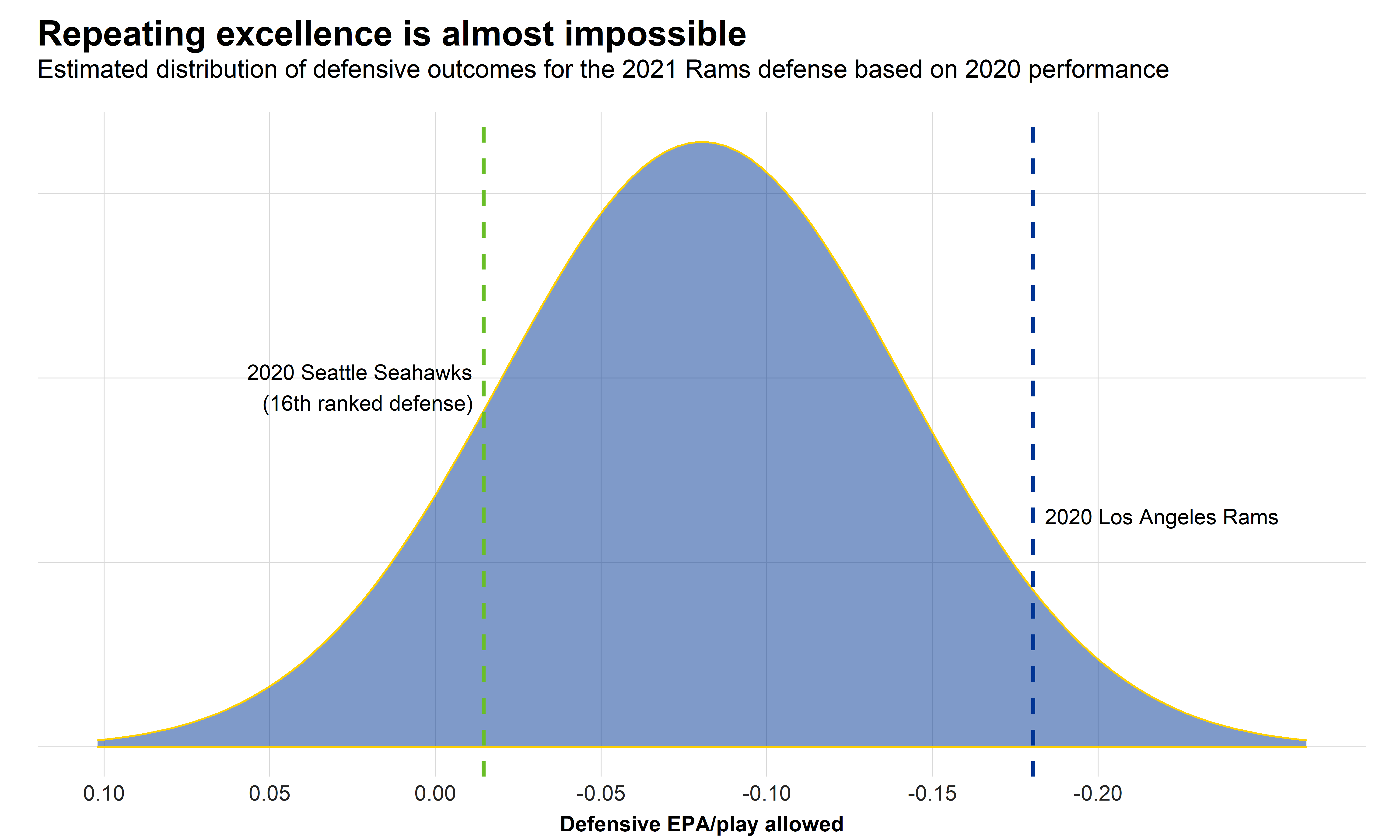
We can see the expected median performance is significantly worse than last year, and repeating last year’s outcome is a tail event, as that would happen only 5% of the time. As a comparison, the same distribution suggests a 14% chance the Rams would field a defense that would’ve ranked in the bottom half among all defenses last season.
When estimating the distribution above for all 32 teams and simulating defensive outcomes 10,000 times, the median result for the Rams' defensive is ranking eighth next season. This is well-aligned with what we saw from other recent top defenses in the next year.
Why is that so? Apart from roster turnover, which we will discuss soon, the regression and wide distribution is caused by things that are mostly out of a defense's control, such as luck or the strength of opposing offenses. It’s notable that only the Miami Dolphins‘ defense generated more expected points on opposing turnovers in 2020. If the Rams didn’t create that many turnovers, the Steelers' defense — which had less turnover luck — would have been the first-ranked unit last season.
It’s also notable that the Rams played significant snaps against backup quarterbacks Chris Streveler, Nick Mullens, Kyle Allen, Alex Smith and Nick Foles, all of whom will most likely not have a role in 2021. While Los Angeles didn’t endure the easiest slate of opposing offenses in 2021, the team certainly had it easier than many other squads.
This alone makes it hard for the Rams' defense to land in the right part of the distribution above — and this is before discussing roster (and coaching) turnover. They lost Michael Brockers, the interior defender who played the most snaps next to Aaron Donald, but this is not even close to as concerning as their losses in the secondary. Two starting defensive backs departed, safety John Johnson III (85.6 overall grade in 2020) and cornerback Troy Hill (75.7 coverage grade). No other Rams players saw more defensive snaps than those two, and they excelled at their jobs.
The Rams now don’t have an established slot cornerback, in addition to fielding a questionable linebacker corps, resulting in a weak link over the middle of the field in coverage. Defense is very fragile to weak links, and the Rams are now very top-heavy with Donald and Jalen Ramsey as unquestioned elite defenders. Apart from the problems described above, this also makes them subject to injuries, a topic we will discuss later.
We’ve seen the Rams get exposed over the middle of the field before. That's evident in their 2019 performance, as illustrated by the following heatmap, which describes how many completions a defense allowed in a certain area of the field compared to how many completions we would expect them to allow based on the number of routes the opposing offenses ran into this area.
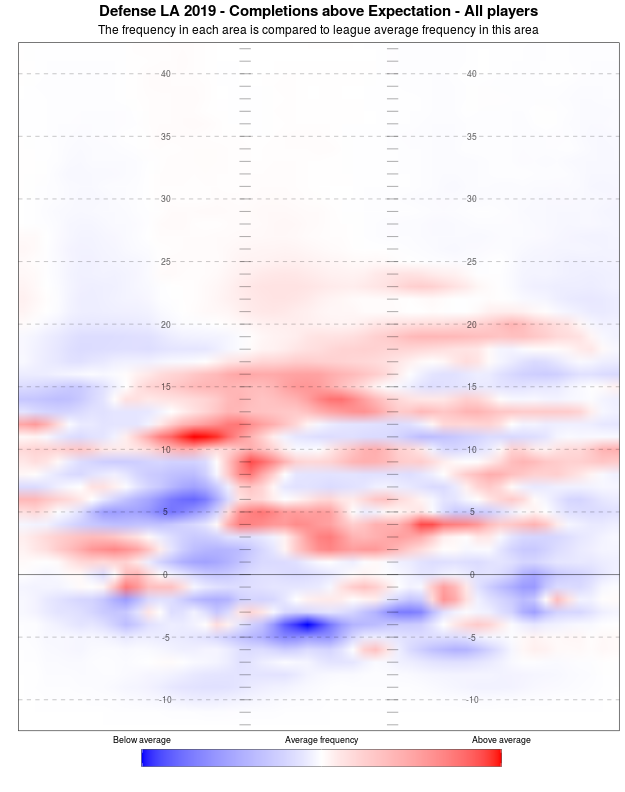
A red area means too many completions, and the liability over the middle of the field was a huge reason for Los Angeles' mediocre defense despite the team trading for Jalen Ramsey. A large part of this problem went away in 2020:
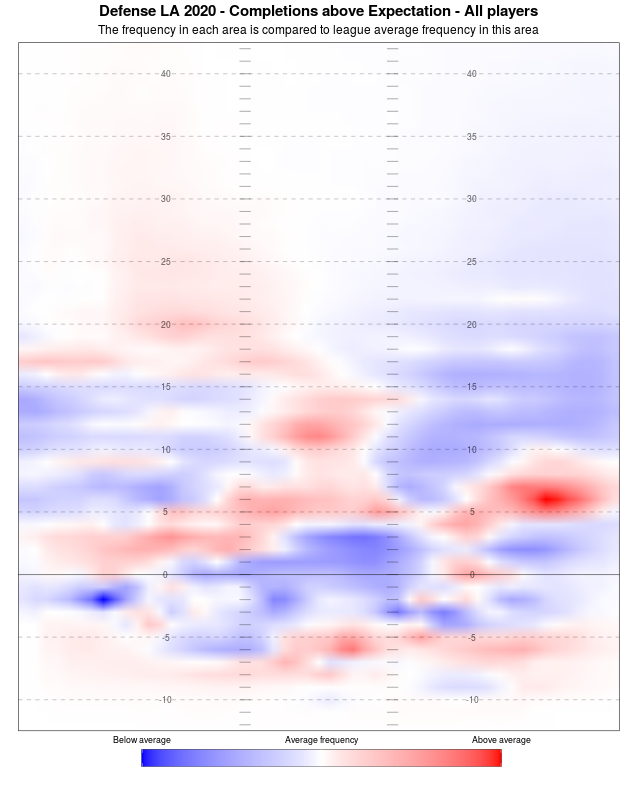
While Troy Hill's emergence might have played a role here, it’s much more likely that the Rams’ biggest defensive loss of the offseason fixed the problem: defensive coordinator Brandon Staley. Staley stayed in Los Angeles but will now cause nightmares for opposing offensive coordinators while leading the Chargers. PFF's Seth Galina has written about Staley’s impact multiple times, and PFF defensive expert Diante Lee and others have also weighed in on the excellence of the first-year coordinator. Losing him alone could cause the Rams to land on the left part of the distribution above, as he projects to be an even bigger departure than the Bears defense losing Vic Fangio after the unit's dominant 2018 season.
The offense
Given the expected regression on the defensive side of the ball, the Rams certainly have to be better on offense to meet the expectation that they will be a better team in 2021 than last year. The team made good on that by investing plenty of draft capital in moves to win now over the course of this past offseason. The betting market also expects the Rams to go from a top-10 team in 2020 to a top-five team in 2021.
The good news is that the offense will almost certainly be better than in 2020, as Matthew Stafford is a better quarterback than Jared Goff. We currently consider Stafford to be a point better than Goff (which translates to roughly half a win over the course of a season). It’s interesting that going into last season, Goff was considered to be three points more valuable against the spread than Stafford, even though that was a comparison to the actual backup — not a generic replacement player. Chase Daniel was most likely considered to be more reliable than John Wolford, so this has to be taken with a grain of salt. Nevertheless, it shows that Stafford was never considered to be much better than Goff, so a point or two is probably the correct estimation as of now.
Rams' passing offense over past four seasons
| Season | EPA/pass play | First downs per pass play | Net yds per pass play |
| 2017 | 0.08 (9th) | 35.3% (9th) | 6.8 (7th) |
| 2018 | 0.16 (7th) | 39.8% (4th) | 7.2 (4th) |
| 2019 | 0.05 (15th) | 34.5% (15th) | 6.1 (15th) |
| 2020 | -0.01 (22nd) | 34.4% (23rd) | 6.1 (21st) |
To meet expectations, the Rams' offense has to go back to its heights from 2017 and 2018 and probably be even better. For some people, the calculation might be easy: McVay reached those heights with a quarterback like Goff, so it’s not a question that he would reach the same heights with Stafford — a more talented and physically gifted quarterback.
Reality isn’t that simple, though. The first question we have to ask ourselves is: What happened with the Rams' offense after 2018? A talking point I’m often hearing is that Goff declined, but to me, this doesn’t make all that much sense. Usually, a quarterback of Goff’s age doesn’t just decline and become a worse version of himself. A look at Goff’s target heatmap can give us a hint.
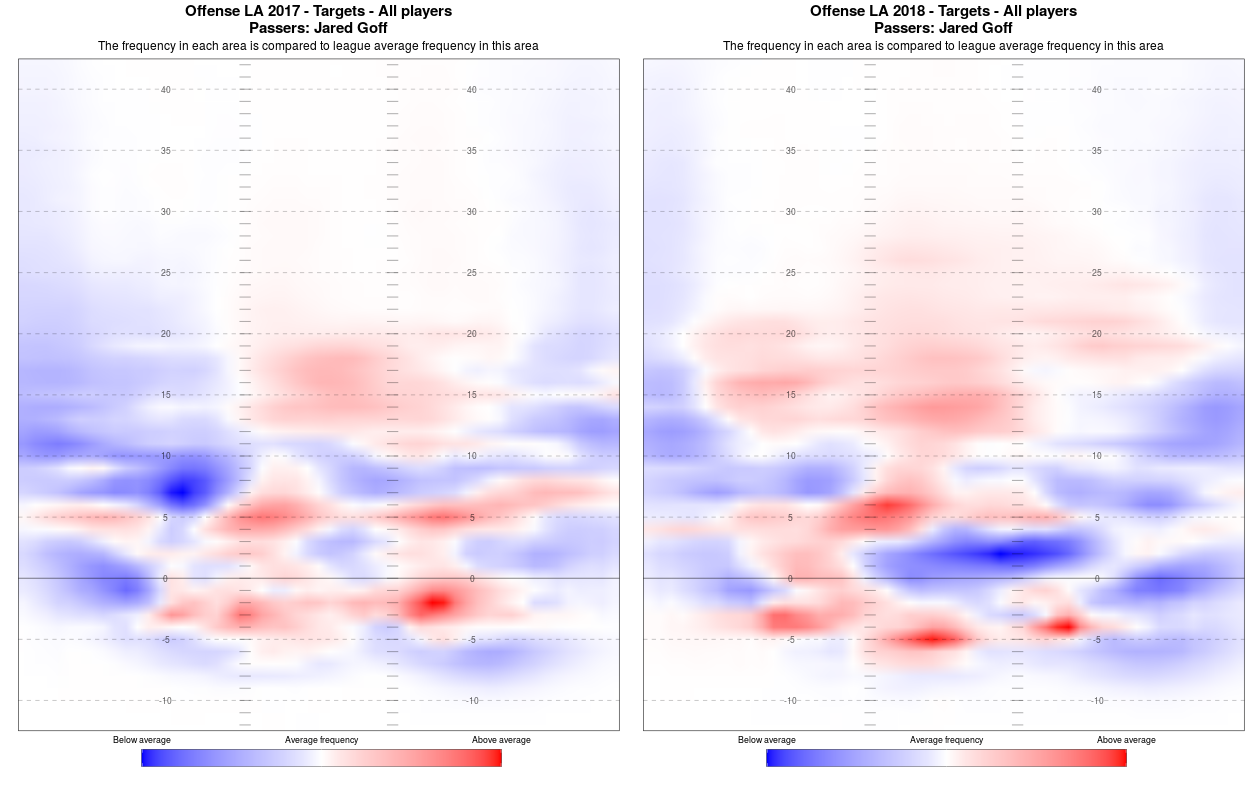
In 2017 and 2018, Los Angeles' offense produced a lot of open receivers over the valuable intermediate and deep middle parts of the field. And Goff threw accurate passes to them, as he ranked sixth in percentage of accurate passes on throws between the numbers with 10 or more air yards over those two seasons. After the Patriots shut down the Rams in the Super Bowl with a strategy the Bears and Lions had used before in the 2018 season, things changed:
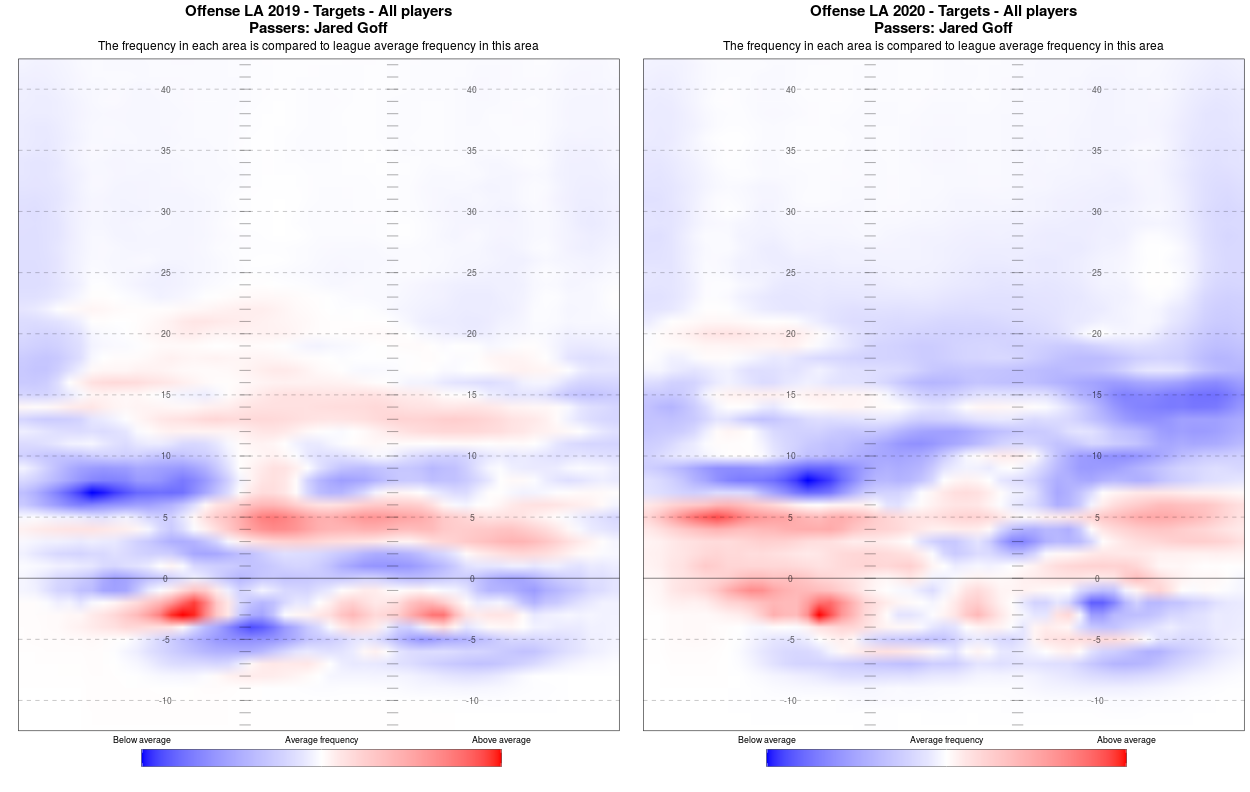
The winning recipe of McVay’s scheme was suddenly gone. Goff was still accurate when making these throws, ranking fifth in percentage of accurate passes on passes between the numbers with 10 or more air yards over the past two seasons, but the Rams' offense failed to generate those throws at a high rate.
This illustrates how Goff hasn’t suddenly become a worse quarterback, but defenses managed to adjust, which led to the failure of what made McVay great in 2017 and 2018: He masked Goff’s weaknesses and amplified his strengths — such as an accurate arm on downfield throws when throwing from a good pocket. From 2019 on, defenses started to expose Goff’s weaknesses.
McVay apparently wasn’t able to properly react to the defenses’ adjustments — at least not with Goff at the helm. Naturally, there is a lot of hope that things become better with Stafford running the offense, but it seems apparent that there is no going back to 2018, at least not to exactly the same offense. Hence, McVay might have to reinvent himself, and Stafford has to learn a new system. That’s a combination with a lot of uncertainty, and whenever uncertainty rises, the expectation shouldn’t be a top-five result league-wide.
The larger point here is the following: When a team has a very good offense with what we believe is only a mediocre quarterback, this doesn’t mean that the unit would be better with a better quarterback. Patrick Mahomes is almost certainly a better quarterback than Ryan Tannehill, but they had almost the exact same EPA per play marks in the 2020 regular season.
Would Mahomes be even better if playing for the Tennessee Titans instead of the Chiefs last year? One can surely raise doubts about that. Good offenses are often a result of tailoring schemes toward their quarterback, and thus the calculation that McVay had great success with Goff in 2018 and subsequently will at least have the same success with Stafford is not based on a stable foundation.
Given all the uncertainty about the Rams' offense, what should we expect from the unit? A good start is, of course, what Stafford has shown during his long career. PFF's Kevin Cole has already written about that, finding that Stafford produced mostly mediocre results with positive outliers, such as in 2011, 2016 and — on a small sample size — 2019. He also discussed Stafford’s supporting cast in Detroit, and it hasn’t been bad.
Obviously, Stafford played with a lot of good receivers, such as Calvin Johnson, Golden Tate, Marvin Jones and Kenny Golladay. He failed to develop a reliable connection with highly drafted tight end Eric Ebron, who scored 13 touchdowns with Andrew Luck in Indianapolis. The Rams’ receiving corps will probably be very close to the average receiving weapons he had over the course of his career, as Robert Woods and Cooper Kupp are solid-to-good wideouts. Van Jefferson needs to take a step forward, and banking on DeSean Jackson to be a reliable weapon is not a good idea at this point in his career.
Contrary to popular belief, Stafford’s pass protection has always been decent-to-good, too. The Lions have ranks in pass-blocking grades over the past 10 seasons, starting in 2011, are as follows: fourth, second, seventh, eighth, 18th, 16th, 16th, seventh, 21st, eighth. They never bottomed out and even had some very good years Stafford couldn’t take much advantage of. It’s unlikely Los Angeles' offensive line will move his pass protection to a higher level this year, as the team has large question marks on the interior. Plus, the Rams' offensive tackle play will most likely decline because Andrew Whitworth — who turns 40 this season — will have a hard time trying to repeat his 90-plus pass-block grade from last year.
All things considered, I expect the Rams' offense to be significantly better than last year, but the median outcome for them seems to be a fringe top-10 offense — not an offensive juggernaut that would make up for defensive regression and turn them into an even better team than last year.
Injuries
Especially with their top-heavy defense, the Rams are extremely prone to injuries. Losing Donald or Ramsey would be catastrophic to their defensive outlook. On the positive side, Los Angeles has been the most healthy team over the past nine seasons. On the negative side, luck probably played a huge part in this. Such as every other team, the Rams could eventually be hit by the injury bug. Injuries add a lot of uncertainty to a team’s protection, and that kind of uncertainty is naturally more threatening to teams with very high expectations but not very deep rosters.
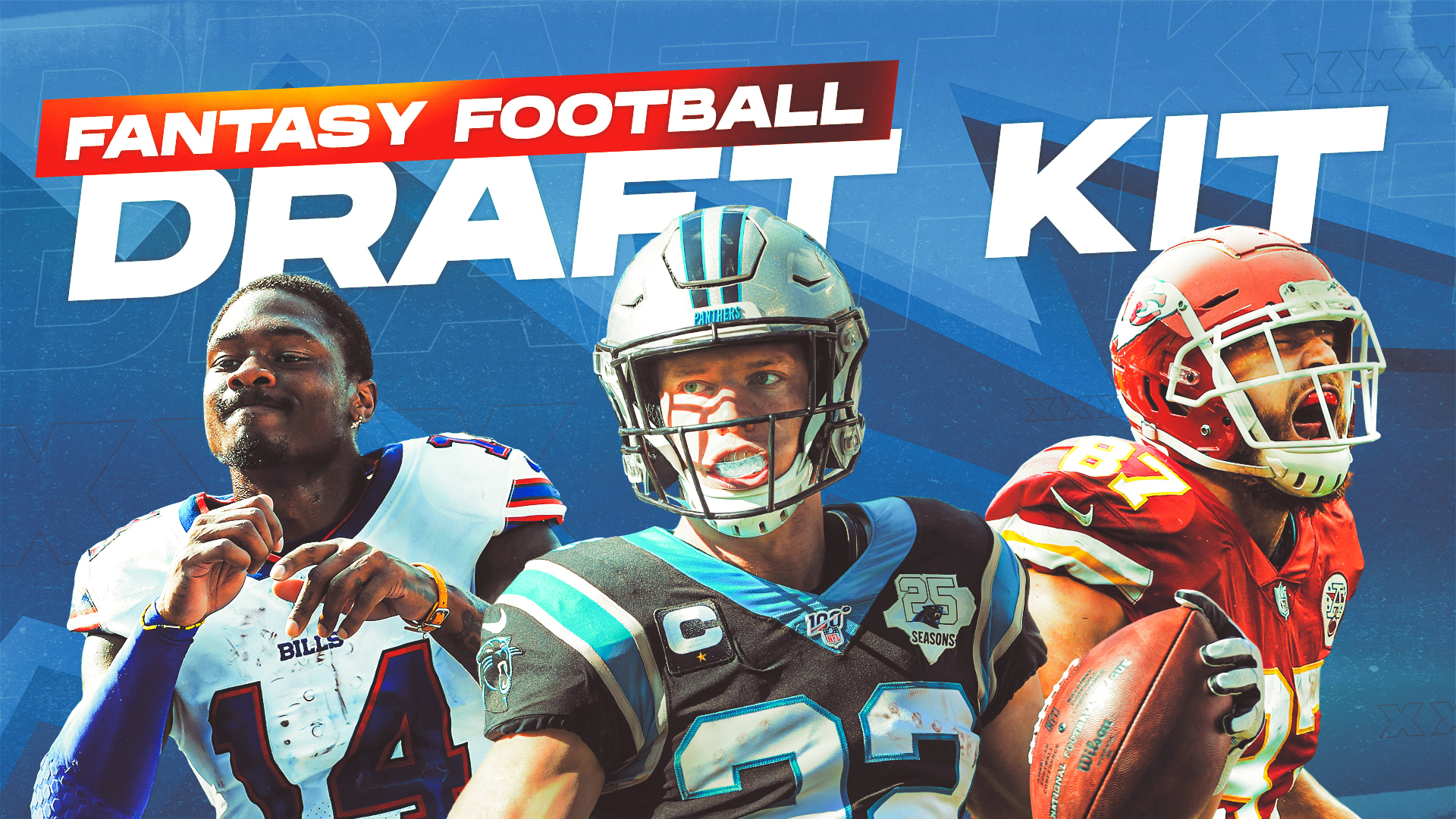
Conclusion
We've painted the Rams in a fairly negative light, but that’s not because the Rams will be bad in 2021. It’s because we're arguing against the expectation that they will be a top-five team, which is the current expectation of the consensus.
The 2021 season could be a fantastic year for the Los Angeles Rams. Maybe Robert Woods and Cooper Kupp run circles around opposing defenders, Van Jefferson takes a step forward, DeSean Jackson plays like his 25-year-old self and Andrew Whitworth ages even more gracefully than Tom Brady. Meanwhile, McVay shows that all he needed is a strong-armed quarterback who can perform some pre-snap reads and Stafford is finally shining in a play-action-heavy offense to lead a top three-offense that more than mitigates the defensive regression and has the Rams meet expectations and win the NFC West.
However, there is a lot of evidence suggesting the contrary. Personally, the Seattle Seahawks seem like the better team in the division in 2021. Given that Russell Wilson is a better quarterback than Stafford and is now pairing up with McVay disciple Shane Waldron, I would expect the Seahawks' offense to be better.
And given what we saw about how close the two defenses actually could be despite their diametrically opposed results last year, I’m going against the market (which is usually ill-advised) and taking the Seahawks over the Rams in 2021.
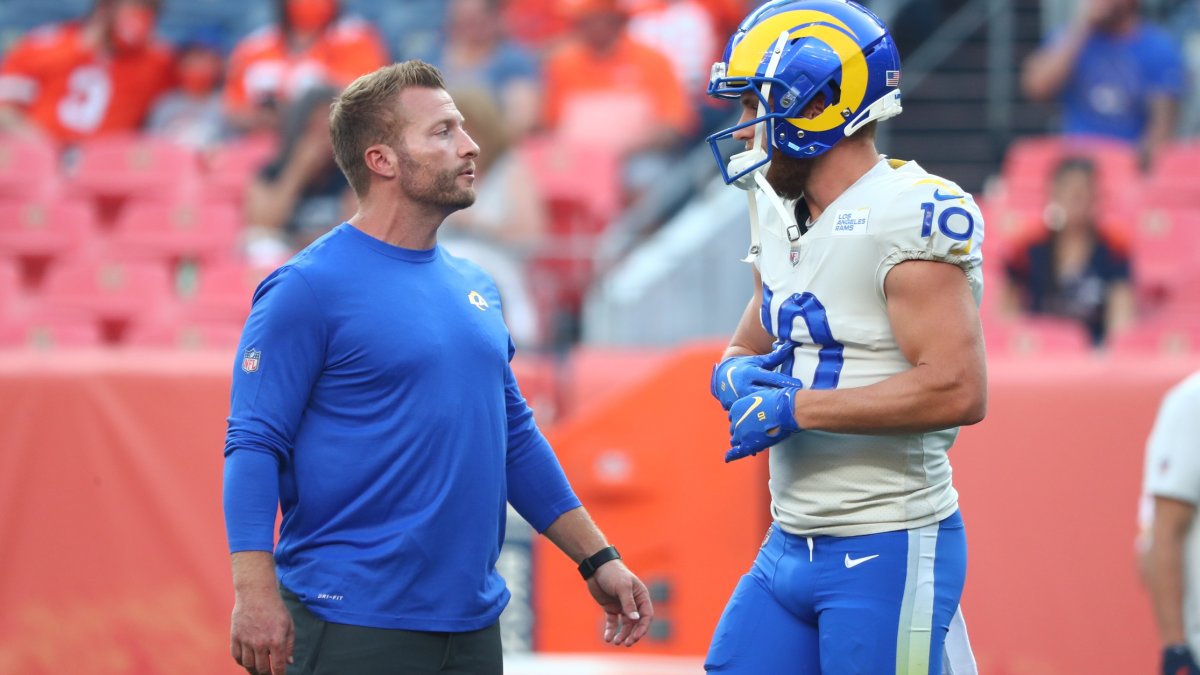



 © 2026 PFF - all rights reserved.
© 2026 PFF - all rights reserved.